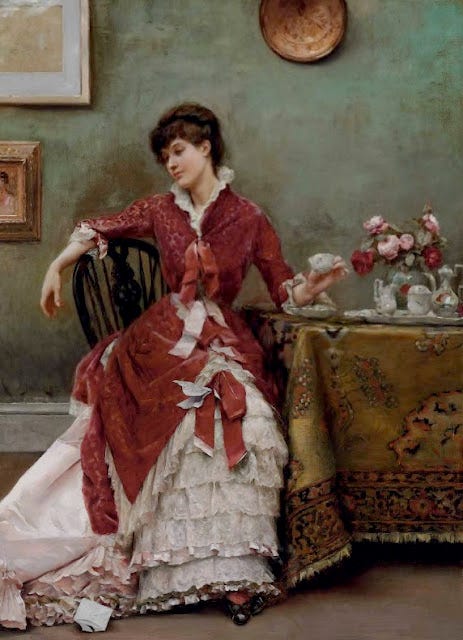The Endgame
Newsletter #26 - Disappointment
Toronto, May 28, 2023
Disappointment
Disappointment (1882) by Julius LeBlanc Stewart
We all struggle with disappointment. It’s part of life. You can be disappointed about anything (and everything). You can be disappointed about personal things—career, love life, family relationships, friendships, bank balance, book sales, etc. You can be disappointed about big things—politics, the evil that lurks in the hearts of men (the Shadow knows!), the prospects for world peace, global warming, etc. Disappointments ebb and flow. They pile up. Most are easy to forget and are best forgotten.
There’s a lot of psychologists, time-and-motion men, other kinds of consultants, assorted academics, pop gurus, etc., who ponderously theorize about disappointment and glibly dispense advice on how to deal with it (e.g., “8 Ways to Turn Disappointment into Meaningful Success” ). But, as is often the case, the best interpretations and insights come from literary writers.
Take Michael J. Arlen’s excellent and beautifully-written book about his parents, Exiles, first published in 1970. Michael J. Arlen (still alive but very old) is a celebrated writer and was the New Yorker’s television critic. His father, also called Michael Arlen, was a once famous author of fiction, best known for his 1924 novel The Green Hat that was made into a movie starring Greta Garbo.
Michael J.’s mother was a Greek countess. The engagement of his parents was reported in breathless terms by The New York Times on January 26, 1928. “The engagement of the noted novelist, Michael Arlen, to Countess Atalanta Mercati is to be announced shortly... The Countess... is described as a beautiful brunette in her early twenties and one of the most accomplished skaters and dancers at St. Moritz, where Mr. Arlen is now living.”
Where’s the disappointment in these glittering lives? The title of Michael J.’s book—Exiles—gives a hint about some of it. His father was born Dikran Kouyoumdjian in Bulgaria to an Armenian family that had fled from Turkey. Dikran Kouyoumdjian (he changed his name to Michael Arlen in 1922) went from Bulgaria, to England, to Italy, to France, back to England, and then to New York where he died in 1956, aged 60. Always on the move. Where was home?
And then there was his sputtering career. He made enough money from The Green Hat, published when he was 29, to buy a yellow Rolls-Royce. Thereafter his professional life did not go well; he slowly withdrew from writing; he lived in second-rate hotels; he claimed close friendships with celebrities, many of whom hardly knew him; much of the time, his son writes, “he really wasn’t doing a thing except having lunch with people.” Michael J.’s mother, the accomplished St. Moritz skater and dancer, followed her husband about, hither and thither, and died an alcoholic in 1964. One presumes they both died disappointed.
What about the son, Michael J. Arlen? He writes about his time as a student at St. Paul’s School in New Hampshire: “By the end of my last year... all the things I most wanted to be I wasn’t. I wanted to be a great school athlete... I would have settled for being what was known as ‘extremely popular’ ... a leader of the school, and important figure on the student council... About all I thought I had going for me then was that I was a ‘good student,’ but even that I secretly believed to be a sham.” (Canadian readers might be interested to know that before Michael J. went to St. Paul’s he attended Ashbury College just outside Ottawa.)
Unlike his father, Michael J.’s career improved steadily as time went by. He graduated from Harvard. He wrote well-received books. He was a New Yorker staffer. He had several children and a successful second marriage (once again, the marriage ceremony was reported on by The New York Times in breathless terms.)
“All the things I most wanted to be I wasn’t,” wrote Michael J. Arlen about his school days. Never mind. All of us feel that way some of the time.




I'm not disappointed about this post. Jangles a nerve. Not only am I alive ... living presupposes the suffering of many disappointments ... but I also have a chronic disease that will never be cured. I was trying to explain that last fact to a bunch of fellow sufferers. How it's necessary to forget disappointment and learn to live with what you've got.